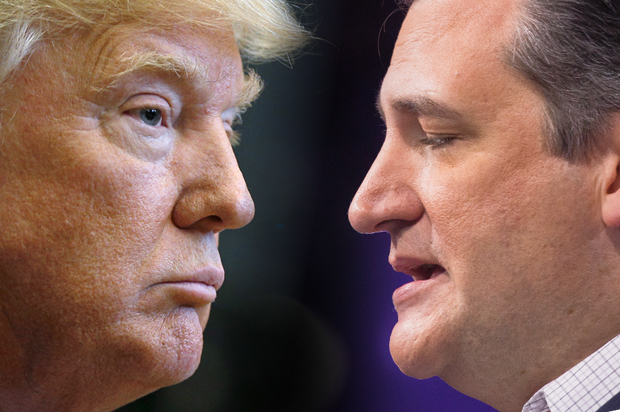The smashing success of Donald Trump’s reality TV show/presidential campaign has obscured something that is in its own way every bit as astounding as Trump’s rise: it’s now obvious that the only alternative to Trump is Sen. Ted Cruz of Texas.
To appreciate how extraordinary and disturbing this situation really is, we must take a historical trip back to a simpler, more innocent time, aka last year. Back then, Nate Silver’s justly respected website FiveThirtyEight.com was practically certain of two things: The two candidates in the very crowded Republican presidential field who had no shot at the nomination were Donald Trump and Ted Cruz.
They had no real chance, the site argued, because Trump and Cruz were each in their own way far too radical candidates for the GOP to actually nominate. Trump’s radicalism is too obvious to belabor. The idea that a virulently racist demagogue, proto-fascist authoritarian strongman, and self-parodying cultural caricature left over from the 1980s could win the Republican nomination for president was crazy on its face, as all reasonable people (with the occasional exception) observed last summer.
As for Ted Cruz, his radicalism was of a different sort than Trump’s, but in many ways he was an even more extreme character. FiveThirtyEight.com pointed out that Cruz was not merely very conservative (all GOP presidential candidates now fit that description, as the party has shifted increasingly rightward in recent years), but radically right-wing, to an extent never before seen in modern American presidential elections.
Indeed, last year the site analyzed the voting records, public policy statements, and fundraising sources of 32 major Republican presidential candidates, going all the way back to Barry Goldwater, and concluded that Cruz was the most right-wing candidate out of this entire group.
Per this analysis, Cruz is far more right-wing than such relatively “liberal” figures — all from that distant era before the Republican Party was taken over by hard-right ideologues — as Richard Nixon, Bob Dole and George H.W. Bush. He is also much more right-wing than Mitt Romney and John McCain. But that isn’t the half of it: based on their respective political records, Ted Cruz makes Newt Gingrich, Ronald Reagan and the current Tea Party-dominated Republican Congress look liberal by comparison.
Here’s a good way to appreciate just how far right you have to go to get to Ted Cruz territory: imagine how left-wing a Democratic presidential candidate would have to be to be Cruz’s mirror image. Such a candidate would have to make George McGovern and the 1970s Congress, dominated by liberal Democrats, look conservative.
To get that far left, we would have to be talking about someone who, for example, would be pushing for eliminating private healthcare, outlawing handgun ownership, guaranteeing a minimum personal income, putting a $5 per gallon tax on gasoline, and imposing a 100 percent estate tax.
And to make the analogy complete, the Democratic candidate’s father would be an unapologetic Maoist, who thought the Cultural Revolution was a great idea, and who advocated limiting political power to avowed atheists, while the candidate was sending his father to campaign events to represent him.
Over the past half-century, the GOP has gradually transformed itself from a moderately conservative institution into a hard right social movement. And Ted Cruz represents the far right wing of a party that has gotten so radicalized that it would be barely recognizable to Dwight Eisenhower.
This November Americans will likely face the choice of voting for either, on the one hand, the contemporary equivalent of Eisenhower, and on the other, either a quasi-fascist at the head of a bargain basement cult of personality, or someone who thinks Barry Goldwater was too liberal.
What the very smart people at FiveThirtyEight.com missed, in other words, is that the GOP has been taken over by the most radical forces in an already-radicalized party. No wonder that, in the space of a few months, the almost inconceivable has become the all-but inevitable.


